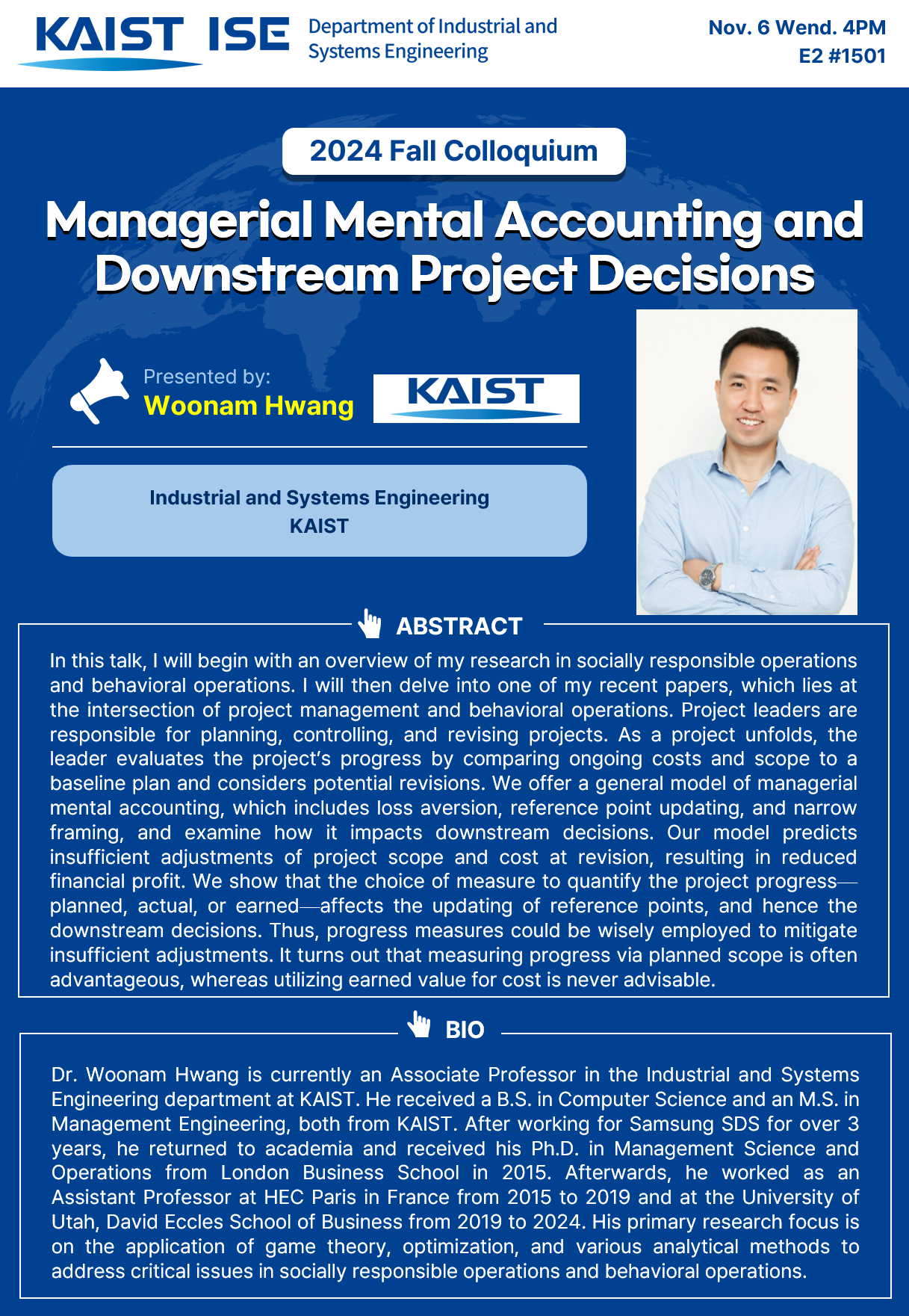뉴스 및 공지사항
- 관리자
- 2024.10.31
- 193
In this talk, I will begin with an overview of my research in socially responsible operations and behavioral operations. I will then delve into one of my recent papers, which lies at the intersection of project management and behavioral operations. Project leaders are responsible for planning, controlling, and revising projects. As a project unfolds, the leader evaluates the project’s progress by comparing ongoing costs and scope to a baseline plan and considers potential revisions. We offer a general model of managerial mental accounting, which includes loss aversion, reference point updating, and narrow framing, and examine how it impacts downstream decisions. Our model predicts insufficient adjustments of project scope and cost at revision, resulting in reduced financial profit. We show that the choice of measure to quantify the project progress—planned, actual, or earned—affects the updating of reference points, and hence the downstream decisions. Thus, progress measures could be wisely employed to mitigate insufficient adjustments. It turns out that measuring progress via planned scope is often advantageous, whereas utilizing earned value for cost is never advisable.
#Bio :
Dr. Woonam Hwang is currently an Associate Professor in the Industrial and Systems Engineering department at KAIST. He received a B.S. in Computer Science and an M.S. in Management Engineering, both from KAIST. After working for Samsung SDS for over 3 years, he returned to academia and received his Ph.D. in Management Science and Operations from London Business School in 2015. Afterwards, he worked as an Assistant Professor at HEC Paris in France from 2015 to 2019 and at the University of Utah, David Eccles School of Business from 2019 to 2024. His primary research focus is on the application of game theory, optimization, and various analytical methods to address critical issues in socially responsible operations and behavioral operations.
# Location: E2 1501
# Presenter: prof. Woonam Hwang, KAIST
In this talk, I will begin with an overview of my research in socially responsible operations and behavioral operations. I will then delve into one of my recent papers, which lies at the intersection of project management and behavioral operations. Project leaders are responsible for planning, controlling, and revising projects. As a project unfolds, the leader evaluates the project’s progress by comparing ongoing costs and scope to a baseline plan and considers potential revisions. We offer a general model of managerial mental accounting, which includes loss aversion, reference point updating, and narrow framing, and examine how it impacts downstream decisions. Our model predicts insufficient adjustments of project scope and cost at revision, resulting in reduced financial profit. We show that the choice of measure to quantify the project progress—planned, actual, or earned—affects the updating of reference points, and hence the downstream decisions. Thus, progress measures could be wisely employed to mitigate insufficient adjustments. It turns out that measuring progress via planned scope is often advantageous, whereas utilizing earned value for cost is never advisable.
#Bio :
Dr. Woonam Hwang is currently an Associate Professor in the Industrial and Systems Engineering department at KAIST. He received a B.S. in Computer Science and an M.S. in Management Engineering, both from KAIST. After working for Samsung SDS for over 3 years, he returned to academia and received his Ph.D. in Management Science and Operations from London Business School in 2015. Afterwards, he worked as an Assistant Professor at HEC Paris in France from 2015 to 2019 and at the University of Utah, David Eccles School of Business from 2019 to 2024. His primary research focus is on the application of game theory, optimization, and various analytical methods to address critical issues in socially responsible operations and behavioral operations.


